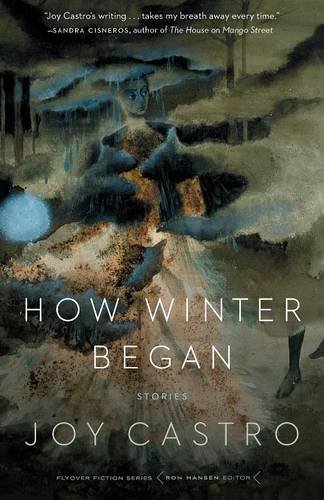[alert variation=”alert-info”]Publisher: University of Nebraska Press
Formats: Paperback, eBook, Kindle
Purchase: Powell’s | Amazon | IndieBound | Barnes & Noble | iBooks[/alert]
Unique voices can be a rare find in the literary world. So much has already been written and processed over the years, it’s common for textual voices to blend together and begin to sound the same after years of reading. It’s always a breath of fresh air when a voice is discovered – whether brand new to the literary world or someone who’s been around for decades. For many, if readers are not already familiar with her ten years of publication, Joy Castro may be such an author. Within her newest collection of short stories, How Winter Began, Castro captures many different marvelous, intriguing voices that will both captivate readers and ground them in realism. The stories tend to focus on Latina women, young mothers, distressed relationships, parenthood, and following aspirations. Readers will have to pause after completing each individual story to reflect on the powerfulness, the delicateness, and the loveliness that was just consumed. Step away. Reflect. Indulge in more. Rinse and repeat.
It’s hard to say when a reader may lose themselves completely in Castro’s work; perhaps by the eighth story, or somewhere along the second. Maybe even after the very first sentence of the book. However long it takes this reviewer can guarantee that it will happen, and before the reader even realizes it they will have completed reading a book filled with gorgeous, heart rending tales of the strength, fragility, awareness, and power of women of color. Needless to say, Castro’s writing style is effective. Her technique is a triumph and an absolute godsend.
Not every story is a knockout, of course, but they are all masterfully written. Each story in How Winter Began is satisfying in similar ways, but also in entirely different ways. Some stories that stick out among the collection are “To Practice The Thing,” “How Winter Began,” “Independence Day,” and “Pottery Barn and the Foster Child” – although, really, picking the best stories out of the twenty-eight amazingly told tales is nearly impossible. Castro genuinely has a way with words, which makes her storytelling impeccable. She weaves poetic lines into her stories like, “Just another kind of stabbing, another kind of wound I did to myself with what I could find,” and, “…the very curves of her face seemed made for love…” Castro works details into her story brilliantly as well. In the only story with a male narrator, “Liking it Rough,” the prepubescent white boy casually mentions his parents owning KKK robes. Although this fact is not lingered upon, it says volumes about not only the era this boy lives in, but the sort of town he resides and the family he inhabits whom he describes as kind people who love to laugh. That’s only one example of many in the way Castro uses strong details to her advantage, enriching all her stories through and through.
Most of all, this author is an important voice. Too often new books coming out focus on the benign problems of Caucasian, middle class people. Castro tells of the strength and vulnerability of women of color in facing sexual abuse, losing children, chasing their dreams, and daring to live in their own brown bodies. The stories in How Winter Began are important and should be pressed into the hands of high school and college students around the world. Castro’s work is a marvel of storytelling, literary technique, and the importance of a strong narrative. It is a literary force to be reckoned with. Why would anyone not want to read this powerhouse of a book?
[signoff predefined=”Social Media Reminder” icon=”facebook”][/signoff]

